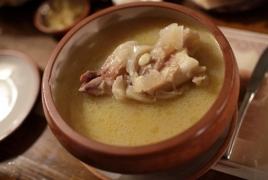Khash - Armenia’s love-it-or-hate-it hangover cure: Smithsonian February 28, 2018 - 11:38 AMT PanARMENIAN.Net - The Smithsonian Magazine has prepared a special feature about an Armenian soup called khash, whose recipe, at its most basic, goes something like this: Simmer cows’ hooves overnight. Serve. "Gelatinous beef trotters—flavored tableside with sinus-clearing add-ins like lemon, salt, vinegar and raw garlic—may sound like the last thing you’d reach for when nursing a hangover, but Armenians swear by khash’s panacean powers, particularly in the winter, when it’s customarily eaten. Across the small Caucasus nation, friends gather for morning-after khash feasts complete with ritualistic toasts and—as Anthony Bourdain discovered while shooting a Parts Unknown episode set to air in March—punishing hair-of-the-dog vodka shots," the article says. "Offal soups are quintessential hangover fare across many cultures, from Mexican menudo rojo to Albanian paçe to Korean haejangguk, but none, perhaps, is as much of an event as Armenian khash." Even the soup’s preparation is a production. The hooves must be plucked meticulously of any stray hairs and soaked in water for a day to remove impurities and funky odors. Then comes the cooking, an eight-hour simmer requiring hourly check-ins, lest the pot dry out. Khash-fueled breakfasts start around 9 a.m., which means cooks often literally lose sleep over the dish. For the broth to remain white and nearly transparent, the mark of a well-made khash, Armenian cooks don’t add salt to the pot during cooking: It’s up to the end user how much salt and other traditional flavorings to mix into the finished soup. Armenians are known to add up to eight cloves’ worth of garlic to each portion. Two types of lavash, or flatbread, always grace the table: dry, for crumbling into the broth, and fresh, for draping over the bowl to seal in the heat. Though khash is an ancient dish, mentioned in medieval Armenian texts as early as the 12th century, the ceremonial fanfare surrounding it appears to be a relatively recent phenomenon. “We haven’t found evidence that today’s khash rituals—the vodka drinking, the three toasts, the specific serving elements—were widespread or well-established before the Soviets arrived,” said Ruzanna Tsaturyan, a researcher for Armenia’s National Academy of Sciences at the Institute of Archaeology and Ethnography, adding that the few historical references that do exist characterize khash as wedding food. iStock / Radist David Vardanyan is the son of former Karabakh leader Ruben Vardanyan who who is currently imprisoned in Azerbaijan. The number of state universities will be reduced from 23 to 8 by 2030, Minister of Education, Science, Culture and Sport Zhanna Andreasyan has said. From September 21 to November 11, a total of 2,820 Russians registered at a place of residence in Armenia, the police has said. The situation on the contact line between Karabakh and Azerbaijan was relatively stable overnight, the Defense Army says. Partner news |